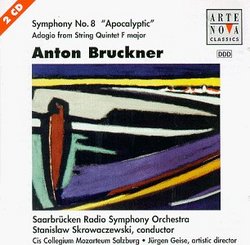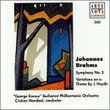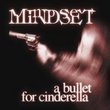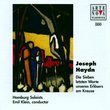| All Artists: Bruckner, Skrowaczewski Title: Symphony 8 Members Wishing: 0 Total Copies: 0 Label: Arte Nova Records Release Date: 1/1/1998 Genre: Classical Styles: Chamber Music, Symphonies Number of Discs: 2 SwapaCD Credits: 2 UPC: 743213401621 |
Search - Bruckner, Skrowaczewski :: Symphony 8
 | Bruckner, Skrowaczewski Symphony 8 Genre: Classical
|
Larger Image |
CD DetailsSimilar CDs
|
CD ReviewsSkrowaczewski Climbs the Mountain Richard Glenn Woods | Albuquerque, NM | 02/02/2000 (5 out of 5 stars) "The Bruckner 8th - the Mount Everest of Symphonies - runs 82+ minutes in this recording, but it is an journey not to be missed. Skrowaczewski has an extraordinary ability to draw from ensembles not well known, such as the Saarbrucken RSO, performances of complete conviction, superior execution, and lucid conceptualization. This is one such performance. It readily takes its place among those of more famous ensembles with celebrated conductors such as Karajan, Giulini, Jochum, and Barenboim, and it comes on a bargain label! To my ears it surpasses them by capturing the mystery, awe, and power with which the religious (and mystic) Bruckner invests his music. This is not a mere technical recital of notes, but a coherent account of the vision which guided Bruckner. The recording hall has some slight reverberation, which suits this composer better than cold, clinical studio accoustics. Skrowaczewski's Bruckner series for Arte Nova is just about complete. Unless I have missed it, only the Second and Third Symphonies have yet to be recorded. The others are available on Reference (with the Minnesota Orchestra) and IMP (with the Halle Orchestra) in addition to the Arte Nova series. This conductor really likes Bruckner and it is clear that his selection to receive the Mahler-Bruckner Medal was merited. With each phrase lovingly molded, each climax deftly controlled, and the line of the composition sustained so convincingly, this has to be an essential recording for the collector.The Adagio lasts 28+ minutes, yet is so full of musical expressiveness, that it captivates one's attention completely. The Finale contains ominous suggestions of apocalypse and ends in triumphant power. With recordings having ever shorter lives these days, hurry to add this one to your collection. If you are new to Bruckner, you might as well start at the top with this one." One can not say enough good things about this recording! Gregory M. Zinkl | Chicago, IL | 08/06/2000 (5 out of 5 stars) "For me, Bruckner's Eighth has been a lengthy journey. It did not have the immediate appeal that his 4th and 7th symphonies did to me, nor did it have an immediately-appealing blockbuster movement, like the scherzo in Bruckner's 9th.Having tasted Skrow's Bruckner 4, 5, 6, 7, I eagerly awaited the 8th on my platter. It was one of those recordings that stayed on my shelf for awhile before I got to know it better--the first hearing didn't say anything to me. Turns out, that reflects my development as a Brucknerite rather than a reflection on this particular performance.It was Suitner's recording of this work on Berlin Classics (tragically not available, at least at Amazon.com) that taught me all about this piece. He presented a humane and easily-accessible performance that perhaps misses a little in profoundity, but he helped me appreciate the piece overnight. Now enter Skrow and von Karajan. For decades, I'd been reading/hearing about Karajan's last recording of the 8th on DG with the Vienna Phil. I finally obtained it. It is an amazing performance. But it leaves me a little chilled. I don't feel involved. Skrow seems to say for me, "yes, Bruckner's 8th is an amazing symphonic edifice; come with me, and I'll show you it's many splendors, patiently and magnificiently." Perhaps that's over the top (when do I seem to refrain in my reviews? ), but at least you know I'm excited about this recording!The heart of Skrow's interpretation is the great Adagio. Listen to the first statement of the theme by the violins! What delicacy! What finesse! What emotion--conveyed in that one lousy little theme, and *quietly* too! And so he goes, the Saarbrucken orchestra in hand, showing you--involving you--in the wonderful, beautiful journey that is Bruckner's 8th.The first movement conveys everything you want--mystery and drama. Hard to believe that Skrow is in the last part of his life when such passion is there! Whereas Karajan's Vienna recording displays some pretty amazing orchestral control--the two main climaxes with the timpani resounding forth--this same control, which makes the listener say, "yes, that's how it should go" also brings attention to itself. Skrow pays the same attention to detail, but he doesn't bring the listener's attention to it; that is, you are totally drawn into the piece, and not to how the performers are putting it together for you.I could go on forever. Read the previous review. It is right on the mark. It's nice that there's a filler, but after Skrow and Saarbrucken, who cares? And the price is definitely nice." A Triumphant Eighth Thomas F. Bertonneau | Oswego, NY United States | 03/05/2001 (5 out of 5 stars) "Since the 1920s, when broadcasting began, Germany has maintained numerous regional radio orchestras on a thoroughly professional level. During the Nazi period, these orchestras became part of the Reichs Rundfunk Gesellschaft, and their activities fell under the aegis of Joseph Goebbel's Propaganda Ministry. After the war, the occupying Allies in the Western Zone grasped the utility of the regional broadcasting ensembles both in reestablishing normality in German culture and in re-federalizing the recently totalitarian state. American record-collectors began to know ensembles like the Orchestra of Southwest German Radio, Baden-Baden, or of Northwest German Radio, Hamburg, in performances distributed in North America principally by Vox, but also by other labels, during the 1950s and 60s. The repertory was wide, with directors like Hans Rosbaud and Michael Gielen at the helm. The price was low - when I started sampling the Vox/Turnabout catalogue in the late 1960s, the vinyl discs cost about three dollars apiece. Astonishingly, the Arte Nova CDs of the gigantic symphonies of Anton Bruckner cost as little as five dollars. Two conductors contribute to the project, Stanislaw Skrowacewski (who once recorded for Vox/Turnabout with his Minnesota Orchestra!), and Hiroshi Wakasugi. (The distribution is: Skrowacewski, nos. 4, 5, 6, 7, 8; Wakasugi, nos. 1, 2, 9 - in the recordings released so far.) Consider the economics of Arte Nova's Bruckner cycle. The old Vox/Turnabout LPs of Bruckner derived from tapes made in the mid-to-late 1950s. The Arte Nova recordings, in splendid digital sound, are new, yet in terms adjusted for inflation they cost about half (!) what the budget LPs of the mid-1960s did. I strongly recommend the Arte Nova cycle to anyone who is either beginning to explore the work of Anton Bruckner or to anyone looking to find alternate performances of the symphonies. Skrowacewski's performance of the might Eighth Symphony is a good place to start. It is at least the equal of the big-league competition (Jochum, Karajan, Furtwängler, Knappertsbusch, Schuricht, Wand). My test for a superior Bruckner no. 8 is the horn-solo about five or six minutes into the First Movement. It needs to take off like an angel and float with ecstatic serenity in the cathedral-space opened up by shimmer of strings and the airy filigree of woodwinds. If the conductor gets this passage right, then, in my experience, he has the measure of this colossal music, and the listener can be confident about the rest. Skrowacewski gets it right. He structures the First Movement in such a way as to bring out the spiritual tension ingerent in Bruckner's symphonic vision. Skrowacewski's "take" on the Scherzo produces the requisite contrast with the First Movement. The Scherzo, with its reiterated five-note "Deutsche Michael" theme, is the symphonic apotheosis of the Austrian Ländler. The Adagio that follows contains the most prayerful music that Bruckner ever wrote outside his liturgical scores. The Finale gives the Eighth Symphony its nickname, "The Apocalyptic." At its climax, all the major thematic material of the foregoing movements is reprised simultaneously. Any Bruckner symphony needs an effective string-band in order to sound "right." Too few strings deprives the sound of its necessary weight and depth. I don't know what the numerical string-compliment of the Saarnrucken Radio Symphony Orchestra is, but the impression that they make matches that of more celebrated ensembles in the massiveness of its sound. As a filler, we get the Adagio from Bruckner's String Quintet in its string-orchestra version. There are two CDs, but the total is still under ten dollars. It's a magnificent triumph of art, technology, and marketing."
|

 Track Listings (3) - Disc #1
Track Listings (3) - Disc #1


